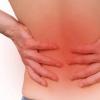CYBERMED LIFE - ORGANIC & NATURAL LIVING
CYBERMED LIFE - ORGANIC & NATURAL LIVING
 Prevent Pain - Pain is a distressing feeling often caused by intense or damaging stimuli. The International Association for the Study of Pain's widely used definition defines pain as "an unpleasant sensory and emotional experience associated with actual or potential tissue damage, or described in terms of such damage"; however, due to it being a complex, subjective phenomenon, defining pain has been a challenge. In medical diagnosis, pain is regarded as a symptom of an underlying condition.
Prevent Pain - Pain is a distressing feeling often caused by intense or damaging stimuli. The International Association for the Study of Pain's widely used definition defines pain as "an unpleasant sensory and emotional experience associated with actual or potential tissue damage, or described in terms of such damage"; however, due to it being a complex, subjective phenomenon, defining pain has been a challenge. In medical diagnosis, pain is regarded as a symptom of an underlying condition.
Pain motivates the individual to withdraw from damaging situations, to protect a damaged body part while it heals, and to avoid similar experiences in the future. Most pain resolves once the noxious stimulus is removed and the body has healed, but it may persist despite removal of the stimulus and apparent healing of the body. Sometimes pain arises in the absence of any detectable stimulus, damage or disease.
Pain is the most common reason for physician consultation in most developed countries. It is a major symptom in many medical conditions, and can interfere with a person's quality of life and general functioning. Simple pain medications are useful in 20% to 70% of cases. Psychological factors such as social support, hypnotic suggestion, excitement, or distraction can significantly affect pain's intensity or unpleasantness. In some debates regarding physician-assisted suicide or euthanasia, pain has been used as an argument to permit people who are terminally ill to end their lives.